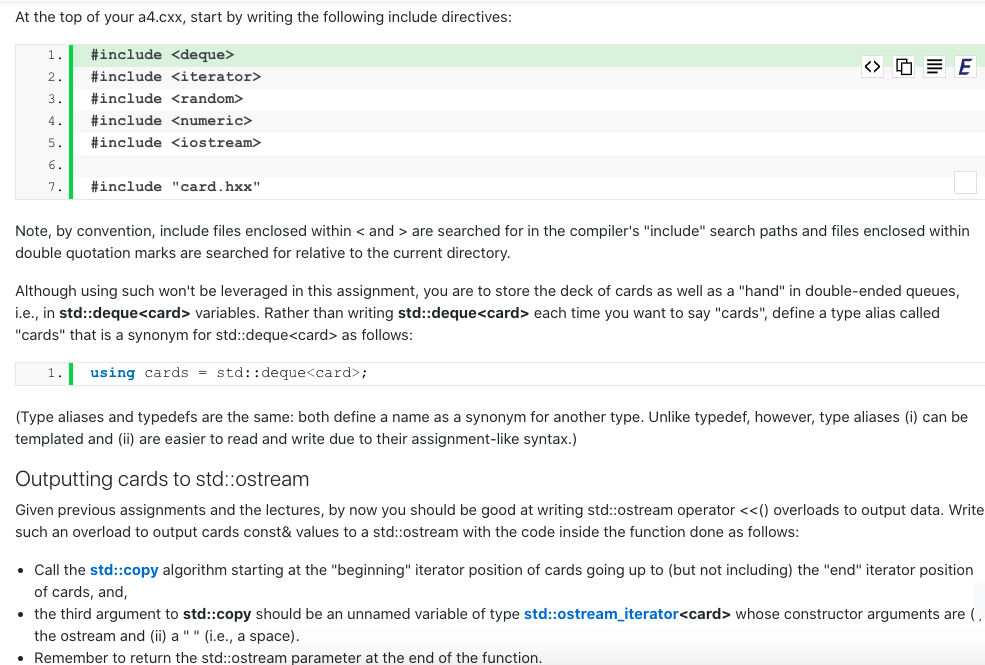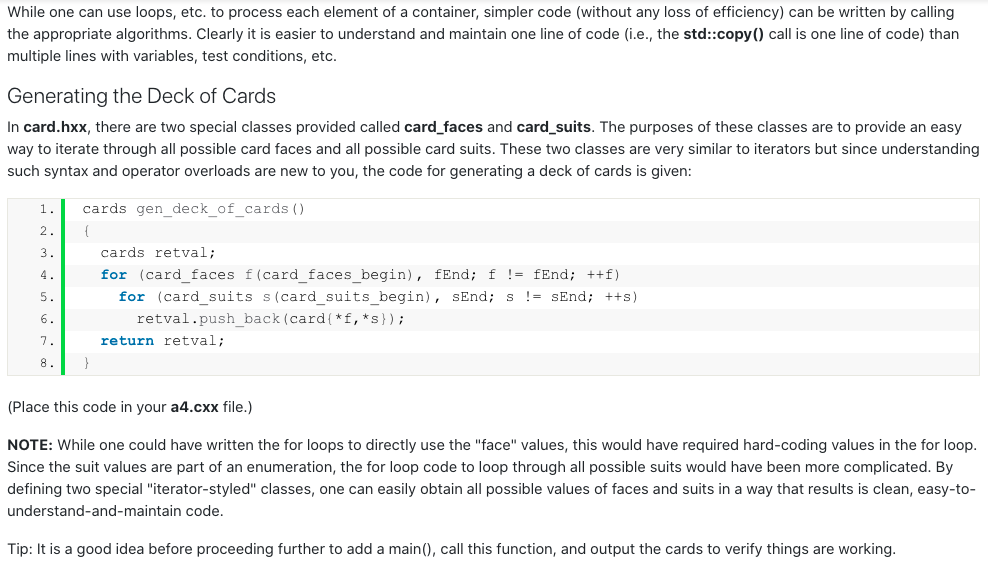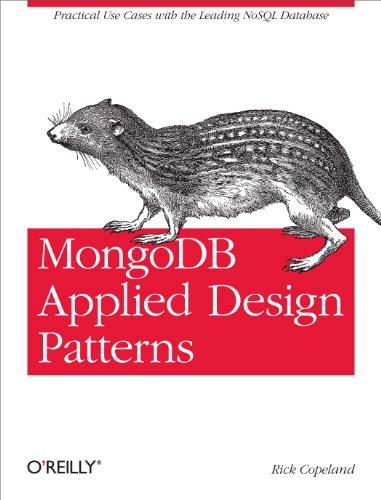Question
C++ card.hxx code: #ifndef card_hxx_ #define card_hxx_ //=========================================================================== #include #include #include #include #include #include #include //=========================================================================== class card { public: using face_type = char; enum
C++


card.hxx code:
#ifndef card_hxx_
#define card_hxx_
//===========================================================================
#include
#include
#include
#include
#include
#include
#include
//===========================================================================
class card
{
public:
using face_type = char;
enum { invalid=0, ace=1, jack=11, queen=12, king=13 };
enum suit_type : char { club, spade, diamond, heart };
private:
face_type face_;
suit_type suit_;
public:
// default construct invalid card value when face_ == 0...
constexpr card() : face_{} { };
constexpr card(card const&) = default;
constexpr card(card&&) = default;
constexpr card& operator =(card const&) = default;
constexpr card& operator =(card&&) = default;
constexpr card(face_type const& f, suit_type const& s) :
face_{f},
suit_{s}
{
if (!valid())
throw std::domain_error("Invalid card.");
}
constexpr auto operator (card const&) const noexcept = default;
constexpr operator bool() const noexcept
{
return valid();
}
constexpr bool valid() const noexcept
{
return face_
}
constexpr face_type face() const noexcept { return face_; }
constexpr suit_type suit() const noexcept { return suit_; }
constexpr void invalidate() noexcept
{
face_ = invalid;
}
constexpr void set(face_type const& f, suit_type const& s)
{
card tmp(f,s);
swap(tmp);
}
constexpr void swap(card& b) noexcept
{
using std::swap;
swap(face_, b.face_);
swap(suit_, b.suit_);
}
friend std::istream& operator >>(std::istream&, card&);
friend std::ostream& operator
};
inline constexpr auto operator (
card::suit_type const& a,
card::suit_type const& b
) noexcept
{
return
static_cast<:underlying_type_t>>(a)
static_cast<:underlying_type_t>>(b)
;
}
inline constexpr void swap(card& a, card& b) noexcept
{
a.swap(b);
}
//===========================================================================
struct card_faces_begin_t final { };
constexpr card_faces_begin_t card_faces_begin{};
class card_faces
{
private:
card::face_type face_;
public:
constexpr card_faces(card_faces_begin_t const&) noexcept :
face_{card::ace}
{
}
constexpr card_faces(card::face_type const& f = card::king+1) :
face_{f}
{
}
constexpr card_faces(card_faces const&)
noexcept = default;
constexpr card_faces& operator =(
card_faces const&) noexcept = default;
constexpr bool operator ==(card_faces const& b) const
noexcept = default;
constexpr card::face_type const& operator *() const noexcept
{
return face_;
}
// prefix ++
constexpr card_faces& operator ++() noexcept
{
++face_;
return *this;
}
// postfix ++
constexpr card_faces operator ++(int) noexcept
{
card_faces retval(*this);
this->operator ++();
return retval;
}
};
//===========================================================================
struct card_suits_begin_t final { };
constexpr card_suits_begin_t card_suits_begin{};
class card_suits
{
private:
std::optional<:suit_type> suit_;
public:
// default constructor constructs invalid suit...
constexpr card_suits() noexcept :
suit_{}
{
}
constexpr card_suits(card_suits_begin_t const&) noexcept :
suit_{card::club}
{
}
constexpr card_suits(card::suit_type const& s) :
suit_{s}
{
}
constexpr card_suits(card_suits const&) noexcept = default;
constexpr card_suits& operator =(card_suits const&) noexcept = default;
constexpr bool operator ==(card_suits const& b) const
noexcept = default;
constexpr card::suit_type const& operator *() const noexcept
{
return *suit_;
}
// prefix ++
constexpr card_suits& operator ++() noexcept
{
if (suit_)
{
switch (*suit_)
{
case card::club: suit_ = card::spade; break;
case card::spade: suit_ = card::diamond; break;
case card::diamond: suit_ = card::heart; break;
default:
case card::heart: suit_.reset(); break;
}
}
return *this;
}
// postfix ++
constexpr card_suits operator ++(int) noexcept
{
card_suits retval(*this);
this->operator ++();
return retval;
}
};
//===========================================================================
//
// For I/O purposes:
// * a "0" face is an invalid card.
// * a "1" face is a 10.
// * a "A", "J", "Q", or "K" face is the same.
// * otherwise the face is a number between 2 and 9.
// * the suit is one of "H", "D", "C", or "S" representing
// hearts, diamonds, clubs, and spades respectively
// * when read in, the suit or face can be in lower case
// * when written out, the suit or face will always be upper case
//
inline std::istream& operator >>(std::istream& is, card& c)
{
std::istream::sentry s(is);
if (s)
{
// read in card "number"...
char ch;
if (is >> ch) // this can skip whitespace
{
switch (ch)
{
case '0': c.face_ = card::invalid; break;
case 'a':
case 'A': c.face_ = card::ace; break;
case '2': c.face_ = 2; break;
case '3': c.face_ = 3; break;
case '4': c.face_ = 4; break;
case '5': c.face_ = 5; break;
case '6': c.face_ = 6; break;
case '7': c.face_ = 7; break;
case '8': c.face_ = 8; break;
case '9': c.face_ = 9; break;
case '1': c.face_ = 10; break;
case 'j':
case 'J': c.face_ = card::jack; break;
case 'q':
case 'Q': c.face_ = card::queen; break;
case 'k':
case 'K': c.face_ = card::king; break;
default:
is.setstate(std::ios::failbit);
is.unget();
return is;
}
}
// read in card suit...
auto ch2 = is.get();
// i.e., unformatted call to get char so no whitespace is skipped
if (ch2 == std::istream::traits_type::eof())
{
// NOTE: unformatted calls return traits_type::eof() to indicate
// an error. This is like checking for a EOF or -1 error when
// doing file I/O in C.
is.setstate(std::ios::badbit);
return is;
}
switch (static_cast
{
case 'C': c.suit_ = card::club; break;
case 'S': c.suit_ = card::spade; break;
case 'H': c.suit_ = card::heart; break;
case 'D': c.suit_ = card::diamond; break;
default:
is.setstate(std::ios::badbit); // invalid suit
break;
}
}
return is;
}
inline std::ostream& operator
{
std::ostream::sentry s(os);
if (s)
{
// output number/face...
switch (c.face_)
{
case card::invalid: os
case card::ace: os
case card::jack: os
case card::queen: os
case card::king: os
case 10: os
default: os (c.face_); break;
}
// output suit...
switch (c.suit_)
{
case card::club: os
case card::spade: os
case card::diamond: os
case card::heart: os
}
}
return os;
}
//===========================================================================
#endif // #ifndef card_hxx_
At the top of your a4.cxx, start by writing the following include directives: 1. GE 2 3. #include
Step by Step Solution
There are 3 Steps involved in it
Step: 1

Get Instant Access to Expert-Tailored Solutions
See step-by-step solutions with expert insights and AI powered tools for academic success
Step: 2

Step: 3

Ace Your Homework with AI
Get the answers you need in no time with our AI-driven, step-by-step assistance
Get Started


